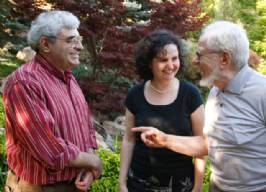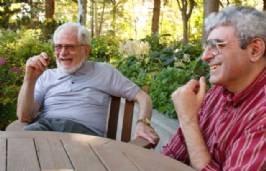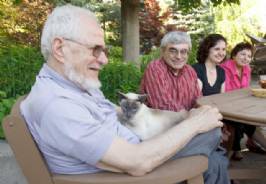 University of Utah physics professor Dany Mattis, right, met Ari Mendes for the first time in Salt Lake City on Saturday.
University of Utah physics professor Dany Mattis, right, met Ari Mendes for the first time in Salt Lake City on Saturday.Daniel Mattis tried for years to contact descendants of the Portuguese diplomat who in 1940 granted his family visas necessary to escape the Nazis.
Aristides Mendes grew up during years in which his mother worked tirelessly for recognition of his grandfather’s efforts to save thousands of war refugees.
Saturday evening the paths of the two men crossed at last in a reunion across 70 years of history that began as a Father’s Day gift idea from Mattis’ daughter, Olivia.
When Mattis, a University of Utah physics professor, opened the door of his Salt Lake City house to greet the grandson of Portuguese diplomat Aristides de Sousa Mendes, it was a moment so charged with awe, quiet awkwardness and gratitude that neither could speak.
”I tried in vain to think of the proper analogy,” Mattis said. ”It’s as if you’re introduced to the person who donated his kidney to you. How do you say thank you? It’s not enough.”
Misty eyed, the two sat down with Mattis’ wife, Noemi, daughter Olivia and her family to watch a French film dramatizing Sousa Mendes’ issuance of more than 30,000 visas in direct defiance of Portugal’s World War II-era government. It was an act of conscience that dearly cost Portugal’s diplomat in Bordeaux, France. Stripped of his post and government stipend by António de Oliveira Salazar, a president who proclaimed Portugal’s neutrality during the war but was partial to Hitler, Sousa Mendes lived the remainder of his life in poverty. So thorough was Salazar’s punishment that the diplomat’s 14 children were compelled to emigrate to find work.
For those who study the war and the Holocaust, Sousa Mendes’ legacy stands alongside those of Germany’s Oskar Schindler, Sweden’s Raoul Wallenberg and others counted among ”the righteous” who helped Jews and other refugees escape almost certain death. Salazar’s infamous ”Circular 14” order prohibited visas to Jews, Russians and other ”undesirables” fleeing Nazi armies. Sousa Mendes, a devout Catholic, drew his line against Salazar saying, ”I would rather stand with God against man than with man against God.”
Mattis’ family members, then bearing the surname Matuzewitz, were among the first to benefit from visas signed by Sousa Mendes. Fleeing their homes in Brussels and Antwerp, they arrived in Bordeaux to line up outside Sousa Mendes’ office for a request. From there, the 8-year-old Daniel and his family traveled by train across Spain into Lisbon and went by boat to Brazil until moving to New York in 1941.


